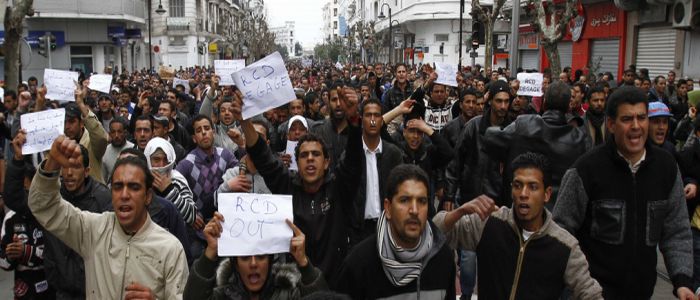"Unemployment, poverty, inequalities, corruption, the repression of fundamental human rights... over and above the features specific to each country, the causes of the revolt are the same everywhere, and lie at the root of the vast and brave mobilisation of so many young people deprived of a future and freedoms. At this truly historic moment, the international trade union movement expresses its support for the legitimate aspirations of the region’s people for greater democracy and social justice. Those in power must stop responding with repression and listen, once and for all, to their peoples’ demands," said ITUC General Secretary Sharan Burrow.
In Libya alone, hundreds of civilians have been savagely massacred in less than a week. Following the terrible loss of lives in Tunisia and Egypt, repression has also claimed all too many victims in Bahrain, Djibouti, Iraq, the autonomous Kurdistan region, and Yemen. Demonstrations have also been suppressed in Algeria.
The ITUC is calling on the international community to ensure that those responsible for these repressive criminal acts are brought to justice.
As revolt also brews in Mauritania, national trade union centres affiliated to the ITUC (CGTM, CLTM, CNTM) held demonstrations last week to press for the opening of a social dialogue to tackle the "explosive situation in the country". On 17 February, Sharan Burrow sent a message to the G20 stressing the urgent need to respond to the problems of unemployment and inequalities that are driving the wave of protest, by implementing global policies supporting growth in employment and incomes. "Jobs and rights, that is what young people in the Arab world are rightly demanding," said Sharan Burrow.
From the very outset, the ITUC, together with its Tunisian affiliate the UGTT, which played a key role in the overthrow of Ben Ali’s dictatorial regime, expressed its full support for the thousands of trade unionists involved in the vast movement for change. "The ITUC, which strengthened its presence in the Arab region at its last Congress in Vancouver in June, is continuing to work closely with the UGTT to meet the future challenges in Tunisia. As two million Egyptians demonstrated their determination, on Friday, to secure a regime change, the ITUC is also continuing to support the new independent trade union movement, a key player in the transition underway. Likewise, in Bahrain, we are standing by our affiliate (GFBTU), which we have joined in condemning the repression and calling for national dialogue," said Sharan Burrow.
"The days ahead are extremely critical. The international community must take action commensurate with the magnitude of the challenges raised by these popular movements, to ensure an end to repression, and the emergence of political, social and economic solutions including employment and social protection as well as bringing the long-awaited freedoms and development to everyone in the region. The building of free and independent trade unionism in the region is essential to the construction of a better future. Trade union freedoms and social dialogue go hand in hand with democracy and development."
As journalists are killed, injured and prevented on a massive scale from performing their key task of informing the public, the ITUC also calls for respect for freedom of the press and the exercise of that right. Responding to the sentencing of a 15-year-old Syrian blogger to five years in prison, the ITUC is calling for an immediate end to obstacles to the use of Internet and other means of communication imposed by all too many rulers in the region.
In Kuwait, hundreds of migrant workers from a range of countries have been demonstrating over recent days for equal civil rights. In Libya, thousands of migrant workers are trying to flee the violence. The ITUC recalls that the fight for human and trade union rights in the region goes hand in hand with the global fight for migrant workers’ rights, especially in the Persian Gulf, where they represent a huge share of the labour force facing widespread exploitation and discrimination.
(*) ITUC Urges Gaddafi to End Massacre of Civilians in Libya


